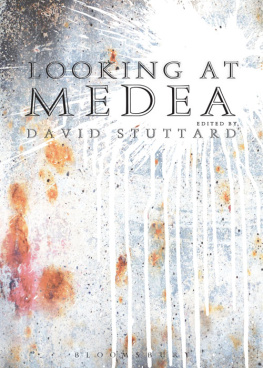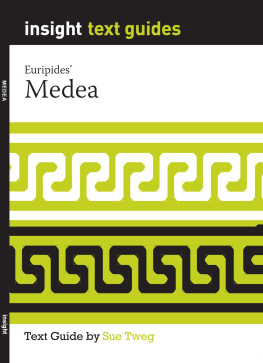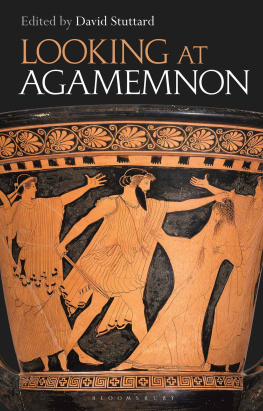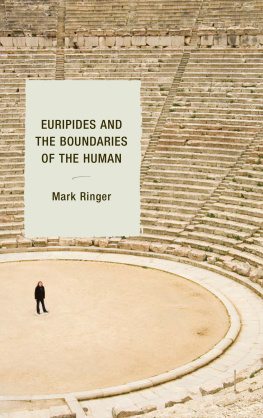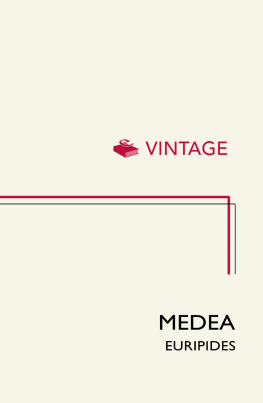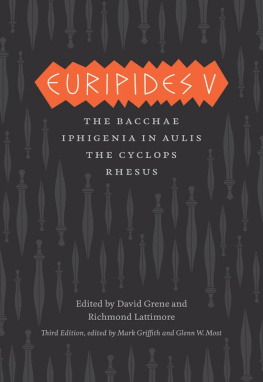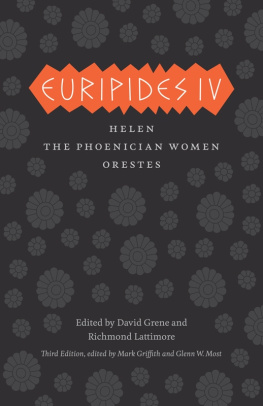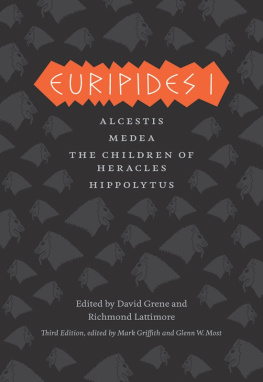
Related titles from Bloomsbury
Looking at Lysistrata , edited by David Stuttard
9781853997365
Euripides: Medea (Companions to Greek and Roman Tragedy), by William Allan
9780715631874
The Plays of Euripides (Classical World), by James Morwood
9781853996146
Costume in Greek Tragedy , by Rosie Wyles
9780715639450
Euripides Talks , edited by Alan Beale
9781853997129
To Theo
Contents
I first translated and directed Medea in 1996 for a touring production by Actors of Dionysus ( aod ), which included a residency at Londons Turtle Key Arts Centre. Many performances were introduced by talks given by eminent UK academics, a combination of scholarship and drama which was, in some respects, the inspiration for the present volume. My translation was thereafter recorded by aod for Penguin Audiobooks, and my subsequent adaptation has since been staged several times. I am grateful to the many actors involved in these productions for enhancing my understanding of the play.
At the heart of this volume are the essays, and my profound thanks go to all the contributors, who have given so generously of their time and expertise. I for one have greatly enjoyed reading and working through this collection, and have learned a great deal from it. Special thanks go to Charlotte Loveridge at Bloomsbury Press, who has been an enthusiastic champion of the project from the start, to the excellent copy editor, Jon Ingoldby, and to Ian Buck and Claire Turner, for designing the book and its cover. My greatest thanks go to my wife, Emily Jane, whose support is fundamental to everything I do, and without whom (like Jason on his Argo ) I would truly be at sea.
David Stuttard is a freelance writer, classical historian and dramatist who founded the theatre company, Actors of Dionysus
Jasper Griffin was Fellow of Balliol College, Oxford, Public Orator and Professor of Classical Literature at the University of Oxford until 2004
Carmel McCallum-Barry is Lecturer in Classics at University College, Cork
Ioanna Karamanou is Assistant Professor in Greek Drama at the University of the Peloponnese
Rosie Wyles is Lecturer in Greek Language and Literature at Kings College, London
Ian Ruffell is Lecturer in Classics at the University of Glasgow
James Morwood is Emeritus Fellow of Wadham College, Oxford
Richard Rutherford is Tutor in Greek and Latin Literature at Christ Church, Oxford
Sophie Mills is Professor of Classics at the University of North Carolina at Asheville
Hanna M. Roisman is Professor of Classics, Arnold Bernhard Professor in Arts and Humanities at Colby College, Maine
Douglas Cairns is Professor of Classics at the University of Edinburgh
Edith Hall is Professor of Classics at Kings College, London
Betine Van Zyl Smit is Associate Professor of Classics at the University of Nottingham
Medea is one of the most frequently performed of all Greek tragedies. With its universal themes of love, betrayal and revenge, it resonates with modern audiences. However, although the script has remained (for the most part) unaltered since Euripides wrote it two and a half millennia ago, the experience and expectations of audiences have changed significantly. Todays religious beliefs, political structures and social norms are very different from those of polytheistic, imperial, slave-owning, patriarchal fifth-century BC Athens. So, while the human emotions at the heart of the play may be immediately recognizable, their context cannot but be alien, and, as a result, Euripides audience is likely to have experienced Medea very differently to a modern one. Certainly, Euripides cannot have imagined that Medea would have proved an inspiration to the early twentieth century suffragette movement, and it is debatable to what extent he conceived the play as the psychodrama as it is so often presented today.
To set Medea firmly in its fifth-century BC context and to trace something of its later history, this volume presents twelve new essays by some of the leading authorities on this play in particular and Greek tragedy in general, along with my introduction and a slightly revised version of my 1996 translation. The subject matter of the essays covers a wide range of issues from earlier versions of the Medea myth and the plays original performance context to twentieth-century interpretations. As was the case in Looking at Lysistrata , authors were given great freedom to choose which aspect of the play to write about, and each was relatively unaware of what the others intended to say. For this reason, there is occasionally a small degree of overlap between some of the essays, with which (to preserve the integrity of each piece) I have deliberately not interfered. Similarly, certain authors disagree with each other (and with me) about the extent to which Euripides used Medea as a vehicle for his own political comment. Again, I have deliberately not tried to impose a three line whip, believing that both this diversity of views and the occasional commonality of subject matter lend a special dynamic to the collection, underlining the fact that Medea remains as vibrant and controversial a play today as it was when it was first performed.
Revisiting the translation has been interesting. Since 1996, when I originally wrote it for a production (and subsequent Penguin Audiobook recording) by Actors of Dionysus (The Independent kindly declared that it gives Euripides wisdom a classic turn of phrase), my style has changed considerably. However, publication of this translation still (I hope) has something to recommend it, not least because it benefited greatly from having been closely read and rigorously commented upon by the late Sir Kenneth Dover. So, aside from a very few revisions, I have kept that original translation essentially as it was. This also means that anyone wishing to hear the words performed can listen to the Penguin Audiobook, a CD of which is now available directly from www.actorsofdionysus.com. Readers wishing to compare my 2001 adaptation of Medea can order it from www.davidstuttard.com, where applications for performance of both translation and adaptation should be made before the commencement of any rehearsals.
David Stuttard
Brighton, 2013
David Stuttard
In peace time sons bury their fathers, but in war fathers bury their sons. If the historian Herodotus was in Athens Theatre of Dionysus on that brisk March morning in 431 BC , he may well have thought of these, his own words, as he watched Medea unfold to its bitter end, where Jason cannot even touch his dead sons, let alone bury them.
For, that spring, war was in the air indeed, tradition suggests that it was to chronicle the coming conflict that Herodotus returned to Athens at around this time and, although the democracys first citizen, Pericles, was promising a relatively easy victory, many knew that, once conflict is unleashed (in the words of the late American political scientist, George Kennan), war has a momentum of its own and it carries you away from all thoughtful intentions when you get into it. To judge by his later works, Euripides was probably cautious of Athens escalating conflict with Corinth and her Peloponnesian allies, and it may be that he was hinting at these cautions in Medea .
So, to set Medea in its historical context and to provide something of a general background to the play and to this book, we should begin by outlining a little of the history of the times and (first) of some of what Medea s original audience might have come to the theatre expecting to see.
Greek Drama a brief history and some technicalities
Tragedy was only one of a number of performing art forms current in classical Athens. Music, song and literature pervaded private homes as well as village and state festivals, where audiences could hear soloists and small ensembles sing to the accompaniment of oboes ( auloi ) or lyres. In the Theatre of Dionysus itself, its wooden benches set on the southern slope of the Acropolis above the flat orkhstra (dancing ground), where the chorus sang and danced in front of the skn (stage building), they could enjoy not only dramas but also performances of choral dithyrambs (hymns to Dionysus). Indeed, it was from these that tragedy was said to have been born, when at a village festival at Icaria one performer, Thespis, assumed the role of one of the songs characters and interacted with the chorus to become the first recorded actor. Drama had been born, but it took until just before the middle of the fifth century BC for it to settle into the form we see in Euripides Medea .
Next page
